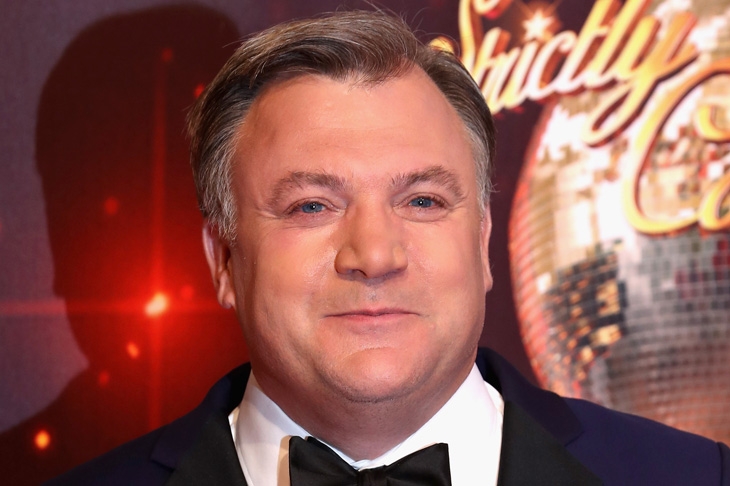In a world where politicians can turn into newspaper editors and former newspaper editors can seize the most coveted job in radio news, it should not be at all surprising that a former shadow chancellor and Labour MP known for his bullish manner has morphed into a chatshow host on radio. Not only that, he’s rather good at it.
Ed Balls’ Dream Dinner Party (Radio 4, Thursday) takes the time-worn formula of putting together a fantasy guest list, seating them round the same table, and waiting for the fireworks to go off, and triumphantly revamps it for the digital age. With some pretty sophisticated editing software, there’s no longer any need to invent the conversations that might erupt if you invite a lot of dead people — Denis Healey, Nancy Astor, Joan Rivers, Les Dawson and Danny Kaye — to share a meal and, with luck, a few fiery verbal exchanges. Digital editing is so much quicker and smoother. All you have to do is ferret in the archives, find some juicy comments from each of your guests on a few well-chosen topics (ambition, Winston Churchill, Paris Hilton, dieting and getting old) and weave their archived voices together.
That sounds too easy. To make it work, and not sound too artificial or cheesy, a whole lot of imagination is needed, shaping the edits, smoothing out the joins, creating a new conversation out of these random clips from the past. Added to which the host himself has to sound convinced that he’s entertaining these long-dead guests for real, that they’re with him in his home, eating his specially prepared smoked salmon pâté, lasagne and chocolate mousse, served with his very own home-baked macaroons.
We could hear Ed trotting down the hall passage to answer the door, whipping up cream for his pudding, leading Healey on to confess that he’d rather people wondered why he never made it to be PM than wonder why he did. He sounds genuinely pleased to see everyone, greeting Healey like a long-lost friend and inviting Dawson to have a go on his piano.
‘Have some champagne,’ he invites Nancy Astor, who, with impressive degrees of disdain, puts down Dawson after he’s cheekily implied that a woman’s role is to stay at home, be a mother, do the cooking. ‘As I told the Archbishop… when you get to heaven God’s not going to ask whether you’ve got on skirts or pants.’ Ed Balls’ Dream Dinner Party was produced by Sarah Peters and Peregrine Andrews.
Roy Williams writes award-winning plays for the theatre but has stayed loyal to radio, creating for Radio 4 a new three-part series of his police drama The Interrogation (first heard in 2012 and directed by Mary Peate). Kenneth Cranham and Alex Lanipekun star as Max, the detective inspector, and his side-kick and protégé Sean, recently promoted to detective sergeant. The format of each play is deceptively simple — the person under suspicion has their say, putting us in the picture, followed by the interview and then the wrapping-up. But Williams packs so much into just 45 minutes of tightly packed, sharp, dynamic dialogue.
Beverley (the always superb Adjoa Andoh) has been looking after her elderly father, who’s gone missing. Max and Sean know what has happened to him (an unsettling reminder that so many streets are now covered by CCTV) but they have to lead Beverley into a confession without giving away what they already know. It’s real cat-and-mouse stuff as Beverley struggles with the aftermath of her decision to take her father into her home to care for him, even though he was suffering from dementia, and in spite of the fact that he abandoned her and his family when she was just two.
All that rage, all that misplaced need to prove that she was not like him. Williams captured it all so powerfully. Beverley’s character is slowly demolished by Max and Sean’s carefully calibrated questions, but Williams ensures that we don’t lose sympathy for her, leaving us with that haunting question: what would I have done in that situation?
Wednesday marked the end of Midweek’s run on Radio 4 after 40-plus years, for the most part chaired by Libby Purves. She always made it sound so easy, gathering a motley crew of celebrities, oddities and worthies round a studio table and getting them to talk to and with each other without drying up, falling out, or talking across each other. What on earth would Thora Hird find in common with Iron Maiden, or Denis Healey with the woman who ran the London School of Striptease? But Purves always made it work because of her genuine interest in the people she was talking to, and her understanding of why we love radio, its intimacy and ability to forge connections, the way we, too, can be part of the conversation. I’m not sure I’ll miss the programme, but I hope Purves will find another niche that takes full advantage of her perfect radio voice, mellow, inviting, modulated, and her enthusiasm for what radio does best — keeping us company, taking us places we would not otherwise have the chance to go, broadening our perspective on life.






Comments